Are honey and dried fruits safe for diabetics?' Uncover the surprising impact of these natural sweeteners on blood sugar levels.
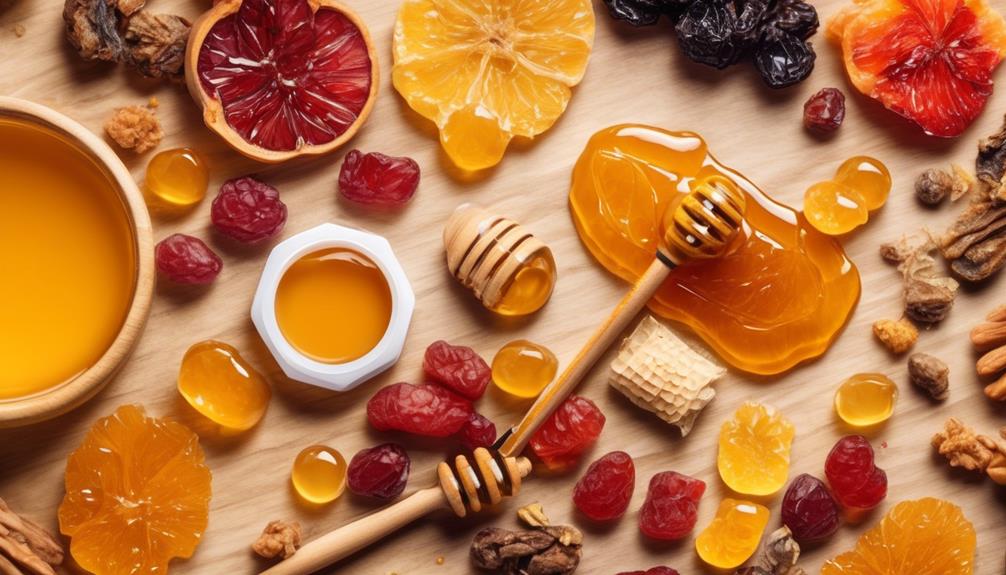
Are Honey and Dried Fruits Suitable for Diabetics
Did you know that approximately 34.2 million Americans have diabetes, according to the American Diabetes Association?
As someone managing diabetes, you're probably constantly considering what foods are safe and beneficial for your health. Among the array of options, honey and dried fruits are frequently debated. These natural sweeteners can be a healthier alternative to refined sugars, but how do they affect your blood sugar levels?
Stay tuned as we probe this intriguing subject, which could potentially alter your dietary choices.
Key Takeaways
- Honey has a lower glycemic index than sugar and can raise blood sugar levels more slowly.
- Consumption of honey and dried fruits should be in moderation due to their calorie and carbohydrate content.
- Monitoring blood sugar levels before and after consuming honey and dried fruits is essential for diabetics.
- Choosing dried fruits with higher fiber content can help in moderating the glycemic response for diabetics.
Understanding Diabetes and Diet
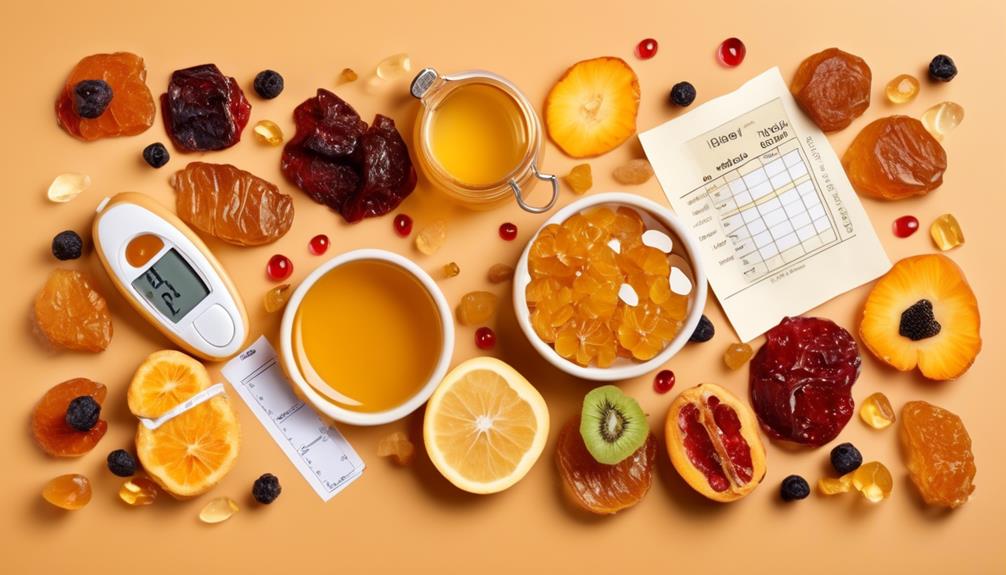
Grasping the link between your diet and diabetes is crucial for managing your blood sugar levels, as every food you consume has a direct impact on your glucose levels. It's not just about avoiding sugar, but understanding how different foods affect your body's insulin production and use.
Carbohydrates, found in foods like bread, pasta, and honey, are broken down into glucose. This raises your blood sugar levels. A diet high in carbs, particularly simple sugars, often leads to blood sugar spikes. Dried fruits, though nutritious, tend to be high in sugar and can have the same effect.
Protein and fats, on the other hand, have little to no effect on blood glucose levels. They can help to slow the absorption of glucose, providing a steady release of energy and preventing sudden spikes. That's why a balanced diet, including lean proteins, healthy fats, and complex carbohydrates, can be beneficial for diabetes management.
It's also important to recognize that everyone's body responds differently to foods. Monitoring your blood sugar levels before and after meals can help you understand your personal response and adjust your diet accordingly. Remember, managing diabetes isn't about deprivation, but making informed choices.
Nutritional Profile of Honey
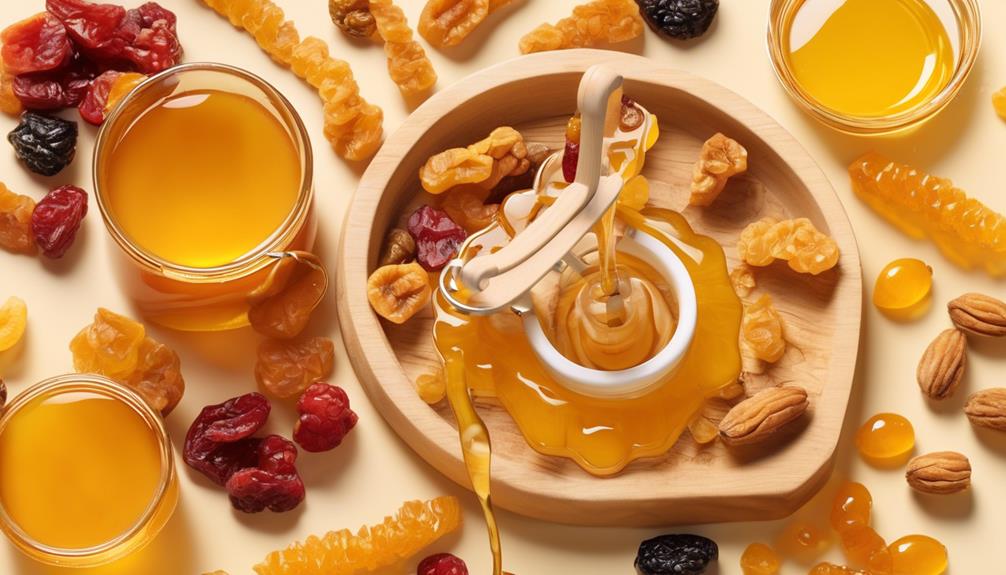
Honey, a natural sweetener, packs a surprising nutritional punch, offering you a range of health benefits despite its sugar content. It's rich in antioxidants, including phenols, enzymes, and compounds like flavonoids and organic acids. These antioxidants have been linked to reducing the risk of heart attacks, strokes, and some types of cancer. They can also promote eye health.
One tablespoon of honey contains around 64 calories, with 17 grams of carbohydrates, most of which are sugars. It's important to note that while honey is healthier than refined sugar, it's still high in calories and carbohydrates, so you should use it sparingly.
Honey also has trace amounts of vitamins and minerals such as vitamin C, calcium, and iron. Despite its small amounts, these nutrients can contribute to your overall health.
Specifically for diabetics, honey has a lower glycemic index than sugar, meaning it won't spike your blood sugar levels as much. However, it's still a form of sugar, so it's crucial to monitor your intake.
Impact of Honey on Blood Sugar Levels
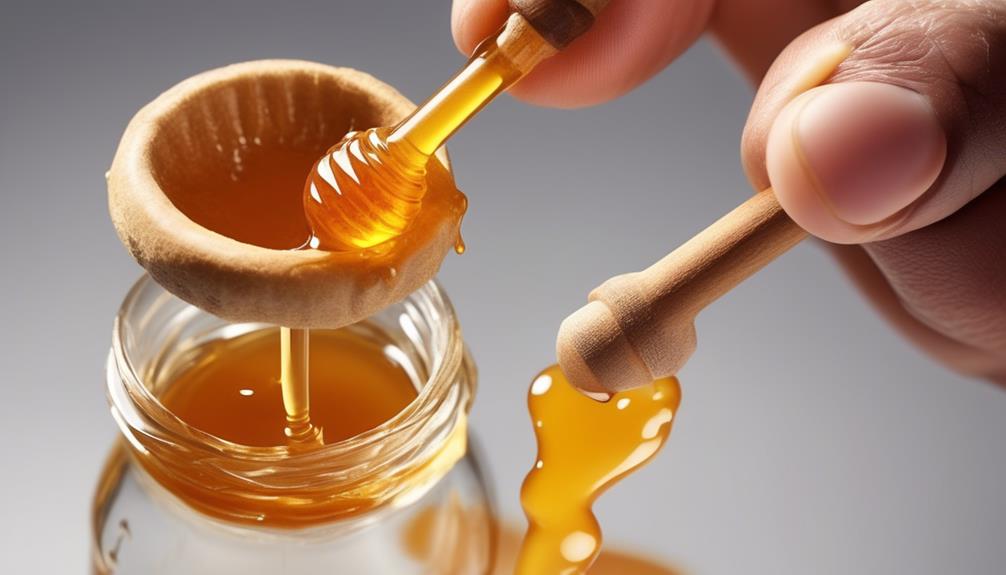
While the nutritional profile of honey offers diverse health benefits, it's also pivotal to understand how this sweetener can affect your blood sugar levels, particularly if you're a diabetic. Being a natural sweetener, honey does have sugars, but it's crucial to remember that these are naturally occurring sugars, not added sugars.
Here's a quick comparison table to help you understand better:
Honey | White Sugar | |
|---|---|---|
Glycemic Index | 58 | 65 |
Fructose Content | 38% | 50% |
Glucose Content | 31% | 50% |
As you can see, honey has a lower glycemic index than white sugar. This means it raises your blood sugar levels more slowly. It's also important to note that honey contains less fructose and glucose than white sugar.
However, don't let these numbers fool you into thinking you can consume honey without any repercussions. It's essential to consume honey in moderation, especially if you're a diabetic. Over-consumption can lead to an increase in blood sugar levels, leading to potential health issues. Remember, managing diabetes is about balance, and that includes balancing your honey intake too.
Nutritional Facts About Dried Fruits
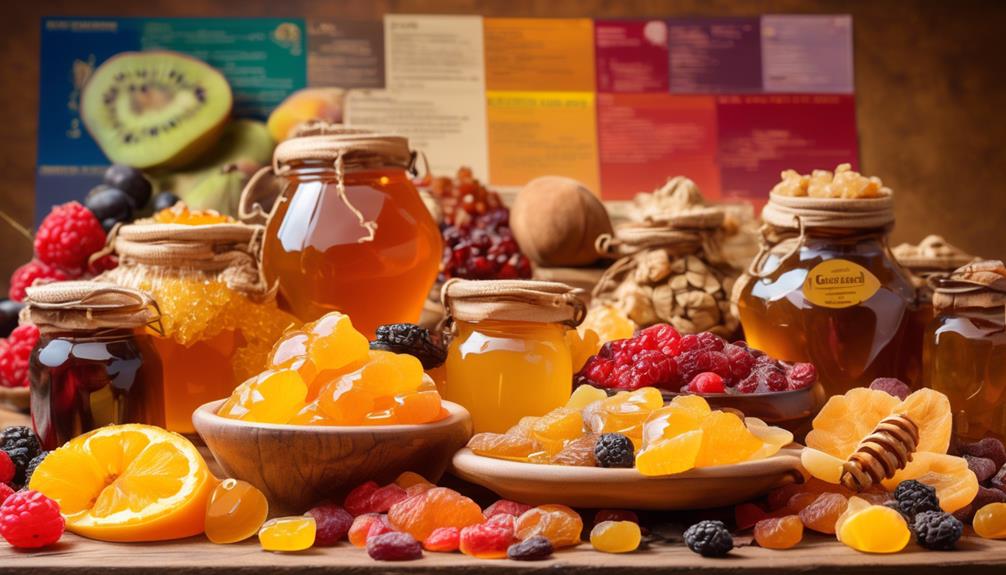
Turning our attention to dried fruits, it's important to note that they're packed with nutrients and fiber, but also contain a high amount of sugar and calories, which can impact a diabetic's blood sugar levels if not consumed in moderation.
Each bite of a dried fruit, such as raisins, dates, or apricots, is a concentrated source of vitamins and minerals. They offer you significant amounts of potassium, iron, and antioxidants. However, the drying process also concentrates the natural sugars in the fruit, leading to a higher carbohydrate count. For instance, a cup of fresh grapes contains 27 grams of carbs, but a cup of raisins contains a whopping 115 grams.
Additionally, dried fruits can be a source of dietary fiber, essential in managing diabetes by slowing down digestion and preventing spikes in blood sugar. However, the high calorie and sugar content means you need to limit your intake. For instance, a handful of dried fruit (about 30 grams) is enough for a day.
Furthermore, it's crucial to choose unsweetened dried fruits. Some are coated in sugar or syrup, which significantly increases their carbohydrate content and can exacerbate your blood sugar levels. Always read the label before you buy.
Dried Fruits and Glycemic Response
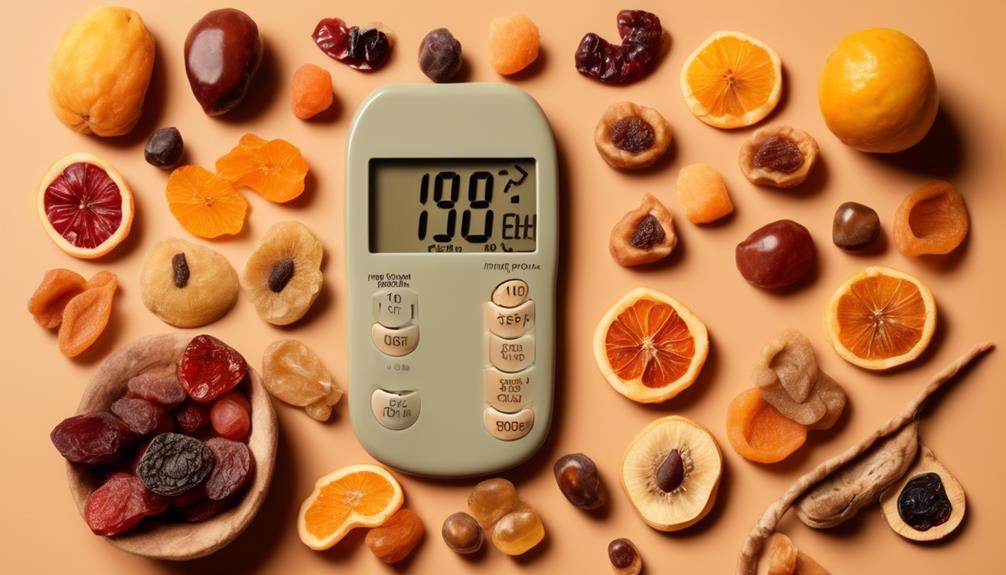
Understanding the glycemic response of dried fruits is crucial for managing your diabetes effectively, as certain fruits can cause a significant spike in blood sugar due to their high sugar and carbohydrate content. It's essential to note that the glycemic index (GI) value of a food item signifies how quickly it can raise your blood sugar. Foods with a high GI value can cause a rapid rise in blood sugar, which isn't ideal for diabetics.
Dried fruits, due to their concentrated sugar content, often have a higher GI value compared to their fresh counterparts. For instance, dates, a common dried fruit, have a GI value of 42-62, which is considered medium to high. On the other hand, prunes, another type of dried fruit, have a lower GI value of 29, making them a better option for diabetics.
However, it's not just about the GI value. The fiber content in dried fruits can help slow down the absorption of sugar, thus moderating your glycemic response. Prunes, for example, are high in fiber, which explains their lower GI value. Therefore, when choosing dried fruits, consider both the GI value and the fiber content.
Conclusion
In conclusion, honey can indeed spike your blood sugar levels, so it's best to limit its intake.
Dried fruits, while rich in nutrients, have a high glycemic index and can influence your blood glucose levels.
As a diabetic, always monitor your daily sugar intake, and remember, moderation is key.
It's crucial to maintain a balanced, nutritious diet and regularly consult with your healthcare provider to manage diabetes effectively.



